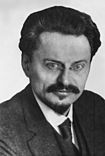IntroductionCommunism (from Latin communis, 'common, universal') is a left-wing to far-left sociopolitical, philosophical, and economic ideology within the socialist movement, whose goal is the creation of a communist society, a socioeconomic order centered around common ownership of the means of production, distribution, and exchange that allocates products to everyone in the society based on need. A communist society would entail the absence of private property and social classes, and ultimately money and the state (or nation state). Communists often seek a voluntary state of self-governance but disagree on the means to this end. This reflects a distinction between a more libertarian socialist approach of communization, revolutionary spontaneity, and workers' self-management, and a more authoritarian vanguardist or communist party-driven approach through the development of a socialist state, followed by the withering away of the state. As one of the main ideologies on the political spectrum, communism is placed on the left-wing alongside socialism, and communist parties and movements have been described as radical left or far-left. Variants of communism have been developed throughout history, including anarchist communism, Marxist schools of thought, and religious communism, among others. Communism encompasses a variety of schools of thought, which broadly include Marxism, Leninism, and libertarian communism, as well as the political ideologies grouped around those. All of these different ideologies generally share the analysis that the current order of society stems from capitalism, its economic system, and mode of production, that in this system there are two major social classes, that the relationship between these two classes is exploitative, and that this situation can only ultimately be resolved through a social revolution. The two classes are the proletariat, who make up the majority of the population within society and must sell their labor power to survive, and the bourgeoisie, a small minority that derives profit from employing the working class through private ownership of the means of production. According to this analysis, a communist revolution would put the working class in power, and in turn establish common ownership of property, the primary element in the transformation of society towards a communist mode of production. Communism in its modern form grew out of the socialist movement in 19th-century Europe that argued capitalism caused the misery of urban factory workers. In the 20th century, several ostensibly Communist governments espousing Marxism–Leninism and its variants came into power, first in the Soviet Union with the Russian Revolution of 1917, and then in portions of Eastern Europe, Asia, and a few other regions after World War II. As one of the many types of socialism, communism became the dominant political tendency, along with social democracy, within the international socialist movement by the early 1920s. ( Full article...) Selected article
Maoism or Mao Zedong Thought (
Chinese: 毛澤東思想,
pinyin: Máo Zēdōng Sīxĭang) is an ideology derived from the teachings of
Mao Zedong. In the
People's Republic of China (PRC) Mao Zedong Thought has been the official doctrine of the
Communist Party of China since the
Cultural Revolution of the mid 1960s, although since the reforms of
Deng Xiaoping the term has had little meaning in practice.
Outside the PRC, Maoism was a term, used from the 1960s onwards, usually in a hostile sense, to describe parties or individuals who supported Mao Zedong and his form of Communism, as opposed to the form practised in the Soviet Union, which these groups denounced as " revisionist." These groups usually rejected the term Maoism, preferring to call themselves Marxist-Leninists. Since the death of Mao and the reforms of Deng, most of these parties have disappeared, but various small Communist groups in a number of countries continue to advance Maoist ideas. Selected biography
Leon Trotsky (7 November [
O.S. 26 October] 1879 – 21 August 1940), born Lev Davidovich Bronshtein, was a Russian
Marxist revolutionary and theorist, Soviet politician, and the founder and first leader of the
Red Army.
Trotsky was initially a supporter of the Menshevik faction of the Russian Social Democratic Labour Party. He joined the Bolsheviks immediately prior to the 1917 October Revolution, and eventually became a leader within the Party, second only to Vladimir Lenin. During the early days of the Soviet Union, he served first as People's Commissar for Foreign Affairs and later as the founder and commander of the Red Army, and People's Commissar of War. He was a major figure in the Bolshevik victory in the Russian Civil War (1918–20). He was also among the first members of the Politburo. After leading a failed struggle of the Left Opposition against the policies and rise of Joseph Stalin in the 1920s and the increasing role of bureaucracy in the Soviet Union, Trotsky was successively removed from power, expelled from the Communist Party, deported from the Soviet Union and assassinated on Stalin's orders. An early advocate of Red Army intervention against European fascism, Trotsky also opposed Stalin's non-aggression pact with Adolf Hitler in the late 1930s. Trotsky's ideas form the basis of Trotskyism, a major school of Marxist thought that is opposed to the theories of Stalinism. Did you know...
Selected image
Communist Party of the Russian Federation supporters rally in Moscow's Triumfalnaya Square.
Photo credit: Vladimir Fedorenko News related to communism
Related portalsRelated WikiprojectsRelated featured content Participate!Everyone is welcome to participate in WikiProject Socialism, where editors collaborate to improve all aspects related to socialism on Wikipedia. Selected quote
SubcategoriesWant to find an article related to communism? Try browsing through any of the main
categories below:
Select [►] to view subcategories
Communism-related topics
GeneralVariations of CommunismOrganizations and ruling parties, past and present
Personalities
Present and former Socialist states (under the direction of Communist parties)
Ideology and tactics
StructureMarxian economics topicsHistorical events
Military topics
Artists and writers
Influential works
Anti-communism
Communism-related listsThings you can do
Communism in non-English WikipediasArticles:
Associated WikimediaThe following Wikimedia Foundation sister projects provide more on this subject:
Discover Wikipedia using
portals |
























